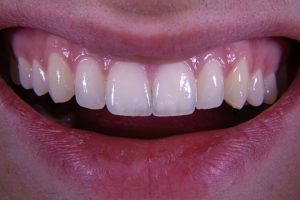“A tooth for every child.” This is a common bit of folk wisdom that actually holds a lot of truth. Before the advent of modern dentistry, it was common for a woman to lose a tooth for each child she bore. This is because, during pregnancy, certain changes take place in a woman’s body that has a detrimental effect on her oral health.
Another reason for this is that dentists are generally reluctant to treat pregnant women. Additionally, an oral examination is not routinely performed during and obstetrical examination, so any early dental problems that could be safely treated are not identified.
In fact, dental care during pregnancy is safe, and an important part of prenatal care. Certain procedures have to wait until a safe time in the pregnancy, and some medications may have to be avoided or modified. With proper planning, most procedures can be safely performed, and those that aren’t safe for the mother or developing baby can be brought to a safe “stopping point” until the woman has recovered from childbirth.
Pregnancy causes hormonal changes that increase the risk of developing gum disease or cause existing inflammation to worsen. “Pregnancy gingivitis” is a term all dentists are familiar with. During pregnancy, especially in the first trimester, a woman’s immune system becomes compromised. This is so her developing baby won’t be seen as an intruder. A woman’s blood volume also increases to support the growing baby. The result is a diminished ability to fight off the bacteria which accumulate after eating.
Pregnancy also causes a woman’s ligaments to become more relaxed in preparation for giving birth. This affects the ligaments which hold the teeth in place, which increases the risk of teeth becoming loose, and bacteria attacking the sensitive tooth root.
Here are some basic guidelines for receiving dental care while pregnant:
- If you are planning to become pregnant, keep all of your regular cleaning appointments, and let your dentists know that you are actively trying to conceive. If you begin any restorative or elective procedures, schedule your follow-ups a month apart, and set a temporary “stopping point”, where your procedures can be safely interrupted.
- Most dentists and obstetricians agree that dental procedures should be avoided, if possible, during the first trimester and the last half of the third trimester. During the first trimester, most experts agree that an expectant mother takes no medications at all. Even routine cleanings can introduce bacteria into the mother’s bloodstream, where it can be passed on to the baby. Procedures during the last half of the third trimester can impede the mother’s blood circulation, due to the size of the baby.
- Morning sickness and hyperemesis gravidarum (excessive vomiting during pregnancy) are common. Sometimes, the act of brushing one’s teeth can trigger a bout of vomiting. If this happens, switch to a bland tasting toothpaste, brush very lightly, or rinse with water copiously after eating. Morning sickness should resolve after the first trimester. If nausea and vomiting continue into the second trimester, prescription medication can be safely given which will allow you to brush.
- Emergencies happen, and there will be times that a pregnant woman needs urgent dental care in the first trimester. No X-rays of any type are considered safe. If a pregnant woman enquires medication of any type, including local or general anesthesia, communication, coordination and cooperation between her dentist and obstetrician are essential. It assures that optimal safety will be provided for both mother and baby and reduces the litigation risk for all involved.
If you notice any dental pain while pregnant, do not take any medication without first speaking to your dentist and obstetrician. There are many safe pain relievers available to pregnant women. May pain relievers considered safe for non-pregnant women can be harmful to a developing baby.







